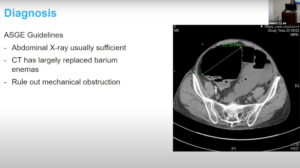NEW YORK (Reuters Health) – In the first-line treatment of advanced colorectal cancer, the combination of cediranib and chemotherapy is comparable to bevacizumab plus chemotherapy in terms of progression-free and overall survival, a multinational team reports.
However, “Patient-reported outcomes (PROs) were significantly less favorable in cediranib-treated versus bevacizumab-treated patients,” the investigators found.
Dr. Hans-Joachim Schmoll, at Martin Luther University Halle-Wittenberg, Germany, and colleagues note in their paper in the Journal of Clinical Oncology online September 10 that targeting VEGF has demonstrated a clinical benefit in previously untreated metastatic colorectal cancer.
In the current study, they compared the efficacy of the VEGF receptor tyrosine kinase inhibitor (VEGFR TKI) cediranib to the anti-VEGF-A monoclonal antibody bevacizumab in combination with mFOLFOX6 chemotherapy in 1,422 patients with untreated metastatic colorectal cancer.
The overall response rate was not significantly different in the two arms, at 46.3% with cediranib and 47.3% with bevacizumab, the team found.
Median progression-free survival in the two arms was also not significantly different at 9.9 and 10.3 months (hazard ratio1.10, p=0.119), respectively, while corresponding median overall survival rates were 22.8 and 21.3 months (HR 0.95; p=0.541), respectively, the report indicates.
Nonetheless, the upper 95% confidence interval for progression-free survival was outside the predefined limit for non-inferiority of cediranib compared to bevacizumab, the authors report.
In terms of tolerability, dose reductions or pauses in treatment were necessary more often in patients treated with cediranib (54%) than in those treated with bevacizumab (36%).
In addition, patients in the cediranib arm reported worsening of symptoms at median of 5.6 months compared to 8.0 months among those receiving bevacizumab.
In discussing the results, Dr. Schmoll and colleagues conclude that this and other trials comparing anti-VEGF and VEGFR strategies suggest that monoclonal antibodies and fusion proteins “may be better suited for clinical use than certain TKIs.”
“However,” they add, “the potential use of oral VEGFR TKIs continues to be investigated.”
SOURCE:
Cediranib no better than bevacizumab in advanced colorectal cancer




